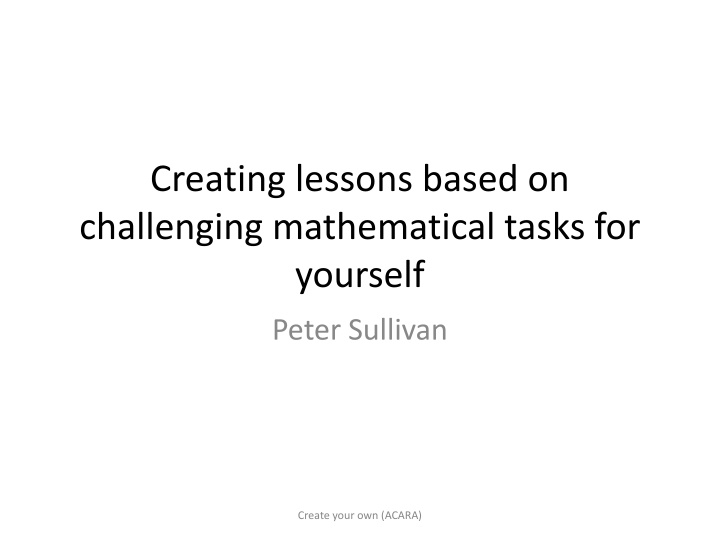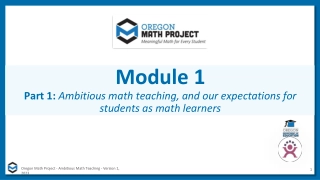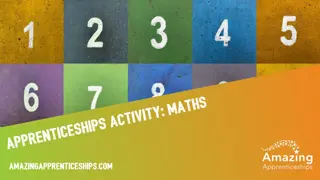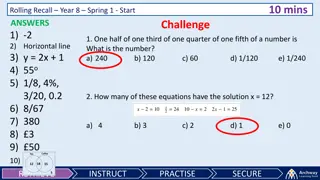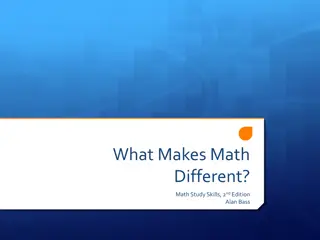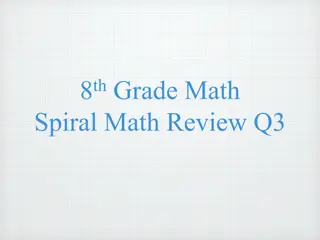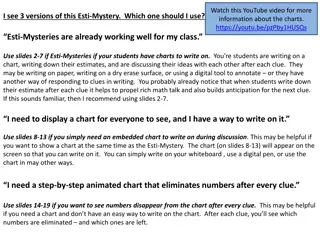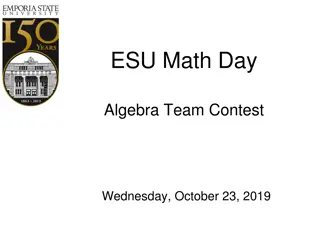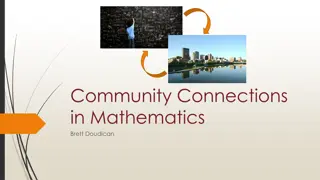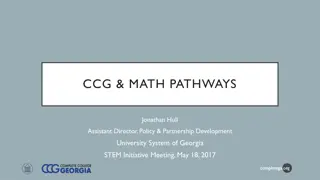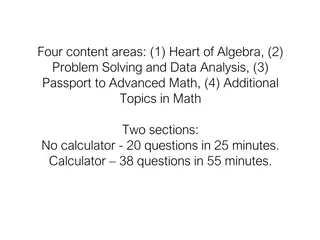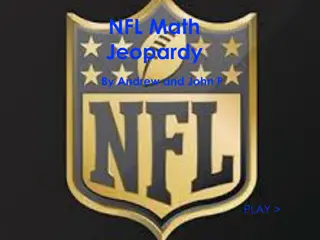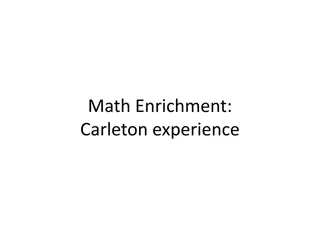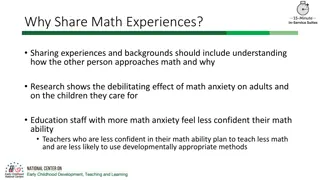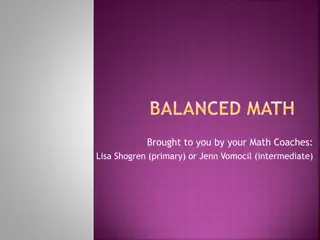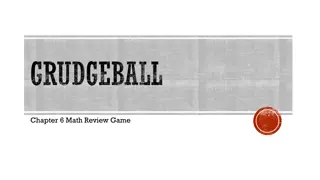Strategies for Creating Challenging Math Lessons
Explore strategies for enhancing mathematics lessons by transforming standard questions into engaging tasks. Learn to create open-ended questions, challenging tasks, and captivating lessons tailored to your students' needs. Empower your teaching with innovative approaches to inspire curiosity and critical thinking in mathematics education.
Download Presentation

Please find below an Image/Link to download the presentation.
The content on the website is provided AS IS for your information and personal use only. It may not be sold, licensed, or shared on other websites without obtaining consent from the author.If you encounter any issues during the download, it is possible that the publisher has removed the file from their server.
You are allowed to download the files provided on this website for personal or commercial use, subject to the condition that they are used lawfully. All files are the property of their respective owners.
The content on the website is provided AS IS for your information and personal use only. It may not be sold, licensed, or shared on other websites without obtaining consent from the author.
E N D
Presentation Transcript
Creating lessons based on challenging mathematical tasks for yourself Peter Sullivan Create your own (ACARA)
Abstract While there are many wonderful resources available, the fastest way to create more challenging and engaging mathematics lessons is to do-it-yourself. This session will outline 5 strategies for creating open-ended questions out of closed ones, challenging tasks out of mundane ones, and engaging lessons from text book questions. Create your own (ACARA)
Overview Four strategies for creating open-middled and/or ended tasks A fifth strategy based that uses text books Creating some tasks Creating some lessons (that use those tasks) Create your own (ACARA)
Either Write down 2 standard text book type questions on a topic you have coming up for a particular level Create your own (ACARA)
Strategy 1: Making things open by working from the answer (this is the most powerful one) Write down a question and work out the answer. Make up a new question that includes the answer as part of the question. Create your own (ACARA)
What is there 4 of? What is there in this room that there is exactly 4 of? Create your own (ACARA)
Rounding A number has been rounded off to 8.7. What might be that number? Create your own (ACARA)
Fishing Seven people went fishing. The mean number of fish the people caught was 5, the median was 4, and the mode was 3. How many fish might each person have caught? Create your own (ACARA)
6 right angles Draw a closed shape that has 6 internal right angles If the perimeter of your shape is 1 km, what might be the dimensions of the sides? Create your own (ACARA)
SA = 22 The surface area of a rectangular prism is 22 sq cm. What might be the dimensions? Create your own (ACARA)
Half way between 7.1 is halfway between two numbers. What might be the numbers? Create your own (ACARA)
What is the similar about each of those examples? Create your own (ACARA)
Apply that strategy to the questions you identified earlier Create your own (ACARA)
Strategy 2: Making tasks open by removing parts Write down a complete question including the answer. Remove some of the question parts. Create your own (ACARA)
LEARNING TASK I did an addition question correctly for homework, but my printer ran out of ink. I remember it looked like __ 4 + __ = __ 0 What might be the digits that did not print? (Give as many sets of answers as you can). Create your own (ACARA)
LEARNING TASK Create your own (ACARA)
I did a multiplication question correctly for homework, but my printer was out of ink. I remember it looked like 2 . __ 3 . __ = __ . __ What might be the digits that that did not print? (give as many answers as you can) Create your own (ACARA)
LEARNING TASK Place each of these numbers onto one of the empty squares to make the sentence true. Find as many different ways of doing this as you can. > Record your solutions Create your own (ACARA)
Inequalities Where might you place these cards on this inequation? __ .__ __ < 3. __ (How many different answers are there?) 6 0 3 2 Create your own (ACARA)
What might be the missing terms? 4x + 3 = __ + __ + __ Create your own (ACARA)
CLOSEST TO 2 Create your own (ACARA)
What is the similar about each of those examples? Create your own (ACARA)
Apply that strategy to the questions you identified earlier Create your own (ACARA)
Strategy 3: Openness through personalising This can be either about them Or they create their unique solution It makes it obvious to the students that they have to engage their own minds in solving the task. Create your own (ACARA)
Write your name using 50 matchsticks Create your own (ACARA)
Some further examples Write a sentence with 5 words with the mean number of letters per word being 4 Draw a graph to show how hungry you are over the day? Someone has a BMI of 27. What might be their height and weight? How does this compare with you? Create your own (ACARA)
Apply that strategy to the questions you identified earlier Create your own (ACARA)
Shoes Rose and Ann go shopping for shoes. Rose chooses one pair for $110 and another for $100. Ann chooses a pair that cost $160. When they go to pay, the assistant says that there is a sale on, and they get 3 pairs of shoes for the price of 2 pairs. Give two options for how much Rose and Ann should each pay? Explain which option is fairer. Create your own (ACARA)
Strategy 4: Forcing connections One approach is to address two or more concepts and build connections between them Another approach is to represent solution methods in two ways Create your own (ACARA)
Addressing concepts simultaneously Create your own (ACARA)
Multiplication and division Some people came for a sports day. When the people were put into groups of 3 there was 1 person left over. When they were lined up in rows of 4 there were two people left over. How many people might have come to the sports day? Create your own (ACARA)
? Create your own (ACARA)
CARTESIAN SQUARES Four lines meet in such a way as to create a square. One of the points of intersection is (-3, 2) What might be the co-ordinates of the other points of intersection? What might be the equations of the lines? Give two different answers. One of the squares should not have any horizontal lines. Create your own (ACARA)
What is the similar in each of those examples? Create your own (ACARA)
Apply that strategy to the questions you identified earlier Create your own (ACARA)
Representing solutions in two ways, Create your own (ACARA)
Pretend that you are using a calculator that has the 4 button broken. How could you work out the answer to 341 + 274 Method 1 Method 2 Create your own (ACARA)
2 If this is 3 3 1 Draw what might be 1 2 Represent your solution using two DIFFERENT methods. Create your own (ACARA)
Another example, A pen and a pencil together cost $7. The pen costs $6 more than the pencil. How much does the pencil cost? Represent your solution using two DIFFERENT methods. Create your own (ACARA)
What is the similar in each of those examples? Create your own (ACARA)
Apply that strategy to the questions you identified earlier Create your own (ACARA)
A fifth approach: Using the text book in different ways Create your own (ACARA)
Consider this example (an example of a text page) Create your own (ACARA)
Some examples In what ways are the questions in this exercise similar? In what ways are the questions different from each other? Which questions match the example at the start and which do not? In what ways is question 2 harder than question 1? In what ways is question 10 harder than question 1? In what ways does question 1 help you answer question 2? Create your own (ACARA)
Some more examples Which questions can you do in your head? Which is the first question you cannot do? Start working at the question before that one. Read the last question first. What do you need to learn to be able to do that questions? Which of the earlier questions look like they might help? Work in pairs. One of you does the odd questions. The other does the even ones. Then each of you can explain your working to the other. Create your own (ACARA)
The lessons consist of One or more challenging task(s) preliminary experiences that are pre-requisite but which do not detract from the challenge of the tasks supplementary tasks that offer the potential for differentiating the experience through the use of enabling prompts (see Sullivan, et al., 2009) which can reduce the number of steps, simplify the complexity of the numbers, and vary the forms of representation for those students who cannot proceed with the task; extending prompts for students who complete the original task quickly which often prompt abstraction and generalisation of the solutions. One or more consolidating task(s) Create your own (ACARA)
